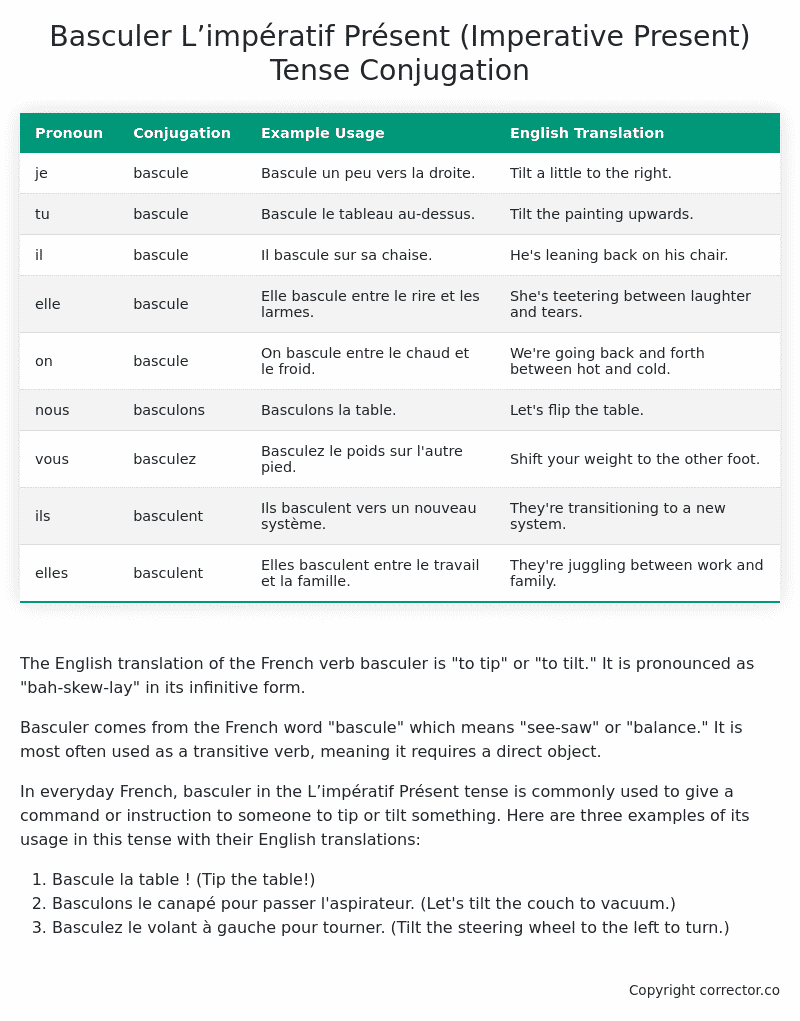L’impératif Présent (Imperative Present) Tense Conjugation of the French Verb basculer
Introduction to the verb basculer
The English translation of the French verb basculer is “to tip” or “to tilt.” It is pronounced as “bah-skew-lay” in its infinitive form.
Basculer comes from the French word “bascule” which means “see-saw” or “balance.” It is most often used as a transitive verb, meaning it requires a direct object.
In everyday French, basculer in the L’impératif Présent tense is commonly used to give a command or instruction to someone to tip or tilt something. Here are three examples of its usage in this tense with their English translations:
- Bascule la table ! (Tip the table!)
- Basculons le canapé pour passer l’aspirateur. (Let’s tilt the couch to vacuum.)
- Basculez le volant à gauche pour tourner. (Tilt the steering wheel to the left to turn.)
Table of the L’impératif Présent (Imperative Present) Tense Conjugation of basculer
| Pronoun | Conjugation | Example Usage | English Translation |
|---|---|---|---|
| je | bascule | Bascule un peu vers la droite. | Tilt a little to the right. |
| tu | bascule | Bascule le tableau au-dessus. | Tilt the painting upwards. |
| il | bascule | Il bascule sur sa chaise. | He’s leaning back on his chair. |
| elle | bascule | Elle bascule entre le rire et les larmes. | She’s teetering between laughter and tears. |
| on | bascule | On bascule entre le chaud et le froid. | We’re going back and forth between hot and cold. |
| nous | basculons | Basculons la table. | Let’s flip the table. |
| vous | basculez | Basculez le poids sur l’autre pied. | Shift your weight to the other foot. |
| ils | basculent | Ils basculent vers un nouveau système. | They’re transitioning to a new system. |
| elles | basculent | Elles basculent entre le travail et la famille. | They’re juggling between work and family. |
Other Conjugations for Basculer.
Le Present (Present Tense) Conjugation of the French Verb basculer
Imparfait (Imperfect) Tense Conjugation of the French Verb basculer
Passé Simple (Simple Past) Tense Conjugation of the French Verb basculer
Passé Composé (Present Perfect) Tense Conjugation of the French Verb basculer
Futur Simple (Simple Future) Tense Conjugation of the French Verb basculer
Futur Proche (Near Future) Tense Conjugation of the French Verb basculer
Plus-que-parfait (Pluperfect) Tense Conjugation of the French Verb basculer
Passé Antérieur (Past Anterior) Tense Conjugation of the French Verb basculer
Futur Antérieur (Future Anterior) Tense Conjugation of the French Verb basculer
Subjonctif Présent (Subjunctive Present) Tense Conjugation of the French Verb basculer
Subjonctif Passé (Subjunctive Past) Tense Conjugation of the French Verb basculer
Subjonctif Imparfait (Subjunctive Imperfect) Tense Conjugation of the French Verb basculer
Subjonctif Plus-que-parfait (Subjunctive Pluperfect) Tense Conjugation of the French Verb basculer
Conditionnel Présent (Conditional Present) Tense Conjugation of the French Verb basculer
Conditionnel Passé (Conditional Past) Tense Conjugation of the French Verb basculer
L’impératif Présent (Imperative Present) Tense Conjugation of the French Verb basculer (this article)
L’infinitif Présent (Infinitive Present) Tense Conjugation of the French Verb basculer
Struggling with French verbs or the language in general? Why not use our free French Grammar Checker – no registration required!
Get a FREE Download Study Sheet of this Conjugation 🔥
Simply right click the image below, click “save image” and get your free reference for the basculer L’impératif Présent tense conjugation!

Basculer – About the French L’impératif Présent (Imperative Present) Tense
Usage
Giving commands
Making requests
Offering advice
Expressing desires
Conjugation Formation
Interactions with other tenses
Want More?
I hope you enjoyed this article on the verb basculer. Still in a learning mood? Check out another TOTALLY random French verb conjugation!


